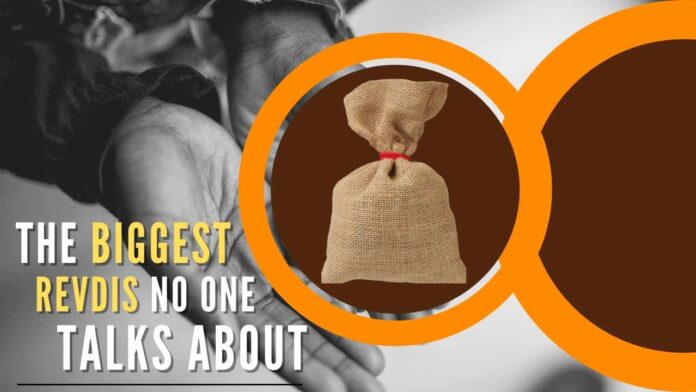
Two more dangerous indirect Revdis
Revdis are among the hottest topics in national debates. I had written in an article titled, “How To Curb Freebie Culture In Politics” in PGurus on 10 July 2022.[1]
The crux of my article was, that it is difficult to distinguish between genuine benefits given to people and freebies, by any objective definition. So, the expert panel constituted by the Supreme Court (consisting of Niti Ayog, Finance Commission, EC, RBI, etc) should, instead, come up with a set of permissible economic indicators for the Central and state governments to meet, like Debt to GDP ratio (ensuring the Centre’s/ State’s ability to service the debt without strain), revenue expenditure as a percentage of government expenditure (ensuring most of the expenses don’t go towards unproductive purposes), Revenue Collection Efficiency (Actual/ Budget), etc.
States or the Centre should only be permitted to offer freebies or benefits, subject to meeting the targets in respect of these indicators.
In the current article, I would like to discuss 2 other indirect revdis which are far more dangerous than the ones the nation is debating about, and yet no one talks about them.
What are revdis?
More literally they are sweets/ gifts, but we mean any benefits given (or promised) to anyone by those in power (or seeking power), illegally, immorally, or unethically for political gains, which could ruin the nation’s economy.
The first indirect revdi I am referring to is a little touchy, though objective people should agree this is revdi too. These are the high levels of salaries and benefits paid to the government and PSU employees.
The most sustainable way of determining salaries and benefits is, by taking into account the value of work/ services rendered by the employees, the capacity of the employer to pay, and fair market salary and benefits for similar jobs.
Governments operate in a non-competitive environment and are under no pressure to minimize costs. When we try to determine the capacity of the government to pay, it should not be stretched as governments tend to do but it should be shrunk as much as possible as it is a revenue expenditure, and the purpose of the government is to serve the people, not to spend liberally for employees; governments need lots of money for capital projects for development.
Given that government jobs are secure, and come with power too, direct and indirect, salaries and benefits can be as low as possible. It may sound outrageous if I say they should ideally have been only about a third of the current levels. If we had continued with the salary and benefit levels of government employees as they existed 50 years back, with fair percentage increases they used to get those days, also providing for inflation, even a third of the current salary levels may not have been reached. So half of the current levels should be liberal.
This may make government jobs less attractive than now, but nepotism would be reduced. When the number of job applicants is 1000 times the number of vacancies, why should governments pay a lot? Salary levels in the private sector are self-regulated based on profitability and market forces.
When salaries of government employees used to be low, the argument advanced to increase them was that lower salaries tempted them to resort to corruption; after salaries have been increased by leaps and bounds over the years, corruption has only increased as their status and power have increased.
Of course, it is difficult to reset the salary levels now, but we should at least agree in principle that the current salary and benefits levels of government employees are part of the problem of budget deficits, inadequate capital expenditures, higher taxation levels, higher corruption, and nepotism.
What can we do now?
At the very least, increments and promotions should be based on performance judged objectively, and non-performers should be weeded out annually.
Politicians won’t talk about the adverse effects of the high salaries of government employees on the economy as they don’t care about the nation, and they compete with each other in misuse of government employees as a class for political ends, as election officials, for collecting bribes, etc.
Any genuine political party that antagonizes government employees will only suffer serious consequences electorally. All this is not to cast aspersions on all government employees. I’m only explaining the intent of politicians to misuse government employees in all ways possible, and most employees are pliable.
Judiciary and executive won’t talk about it as they are beneficiaries of the higher salary and benefit levels too. The media won’t talk about it as they won’t like to antagonize any of these power centre’s in the interest of their business. Again, I don’t mean to cast aspersions on anyone in the judiciary/ executive/ media specifically. I’m only referring to how they act as a class.
The rich and middle class who pay most of the taxes have a right to question this, but have no voice and most often don’t care anyway, beyond whining.
Though the poor may not be paying much to the Government by way of taxes (even indirect taxes, due to their low consumption), they are the most affected by the liberal salaries and benefits to the government employees. This is because they constitute the most unemployed, under-employed, and underserved by government schemes, and better national development from the money saved from lower salaries of government employees should benefit them most. But they are voiceless too, except for voting once in 5 years, which opportunity they squander due to ignorance.
The second revdi I am referring to is corruption. I have dwelt on this in detail in my article titled, “Mother Of All Reforms: Will PM Modi Do It?”[2]
Both these revdis only keep increasing. Who will bell the cat?
Note:
1. Text in Blue points to additional data on the topic.
2. The views expressed here are those of the author and do not necessarily represent or reflect the views of PGurus.
Reference:
[1] How to curb freebie culture in politics – Aug 10, 2022, PGurus.com
[2] Mother Of All Reforms: Will PM Modi Do It? – Jul 09, 2019, PGurus.com
PGurus is now on Telegram. Click here to join our channel and stay updated with all the latest news and views
For all the latest updates, download PGurus App.
- How BJP can get 33%+ vote share in TN - April 1, 2024
- A transparent, equitable electoral funding alternative - March 19, 2024
- How TN BJP can come to No. 1 or No. 2 in 2024 LS polls - January 11, 2024










